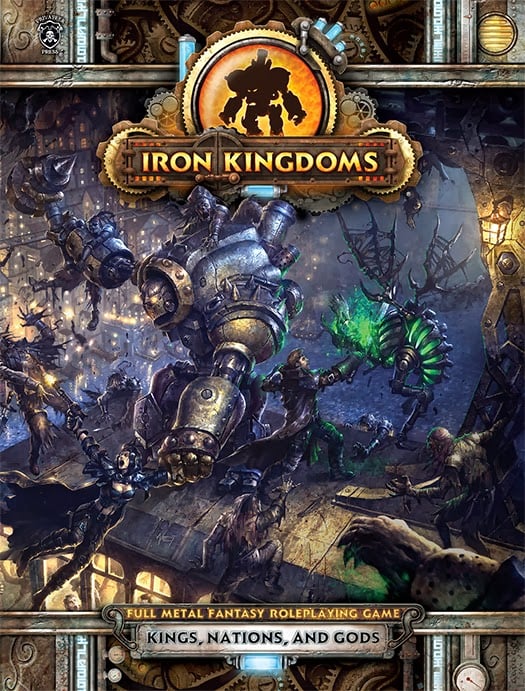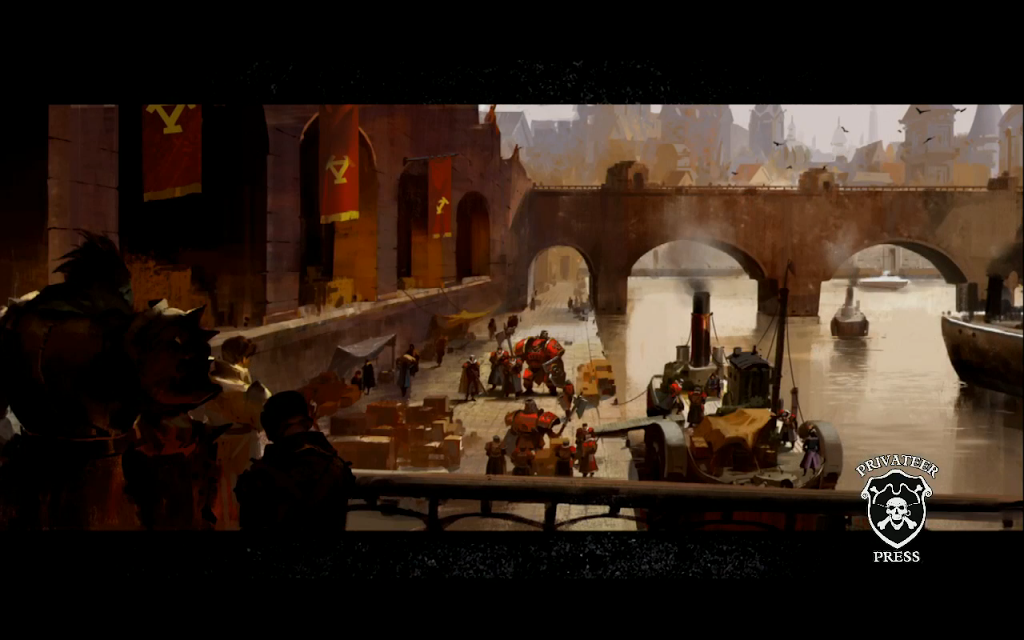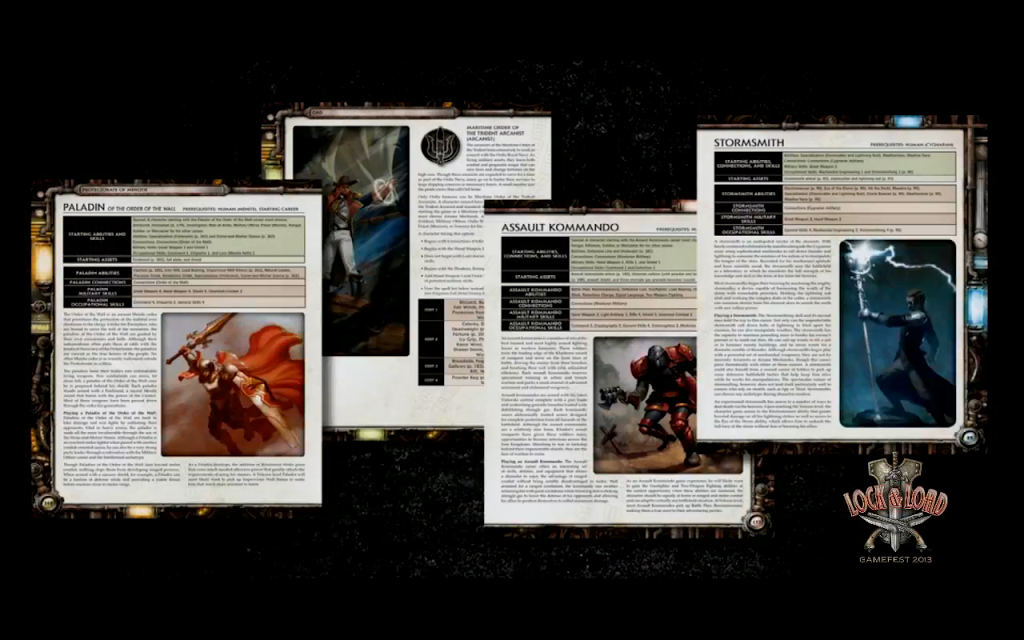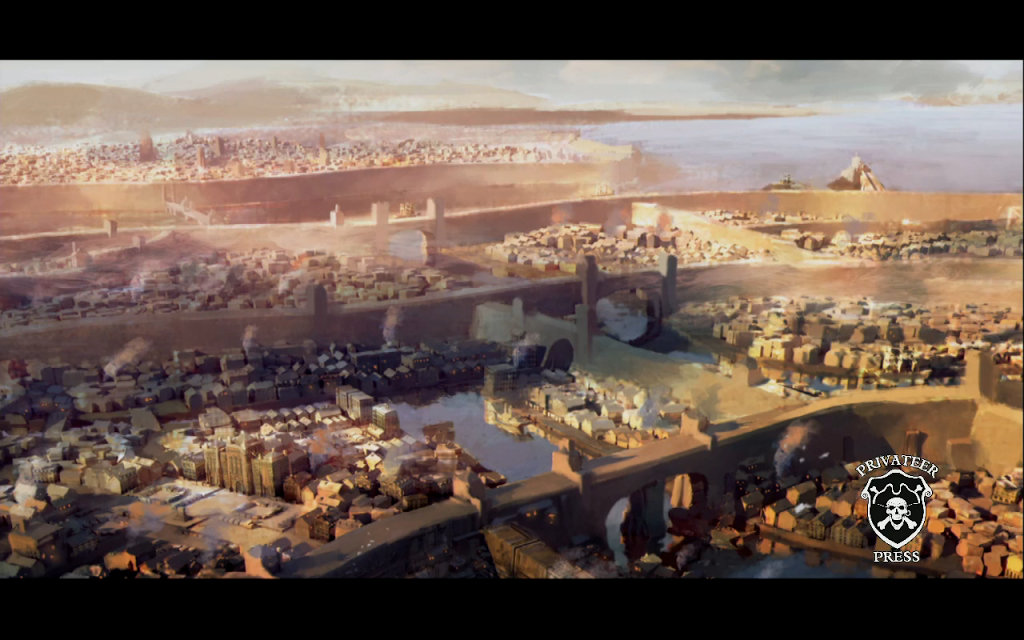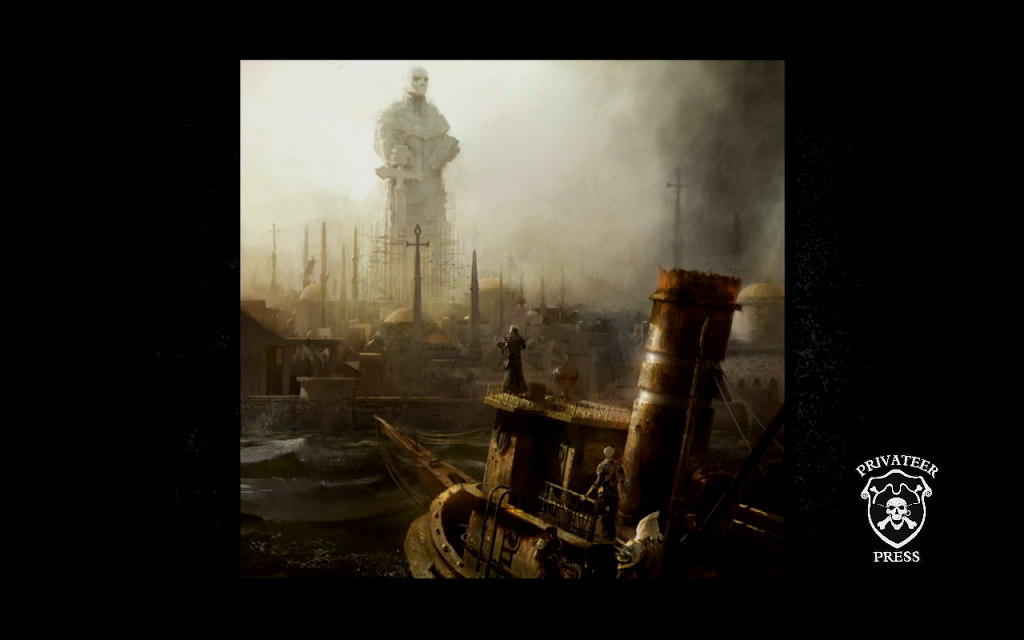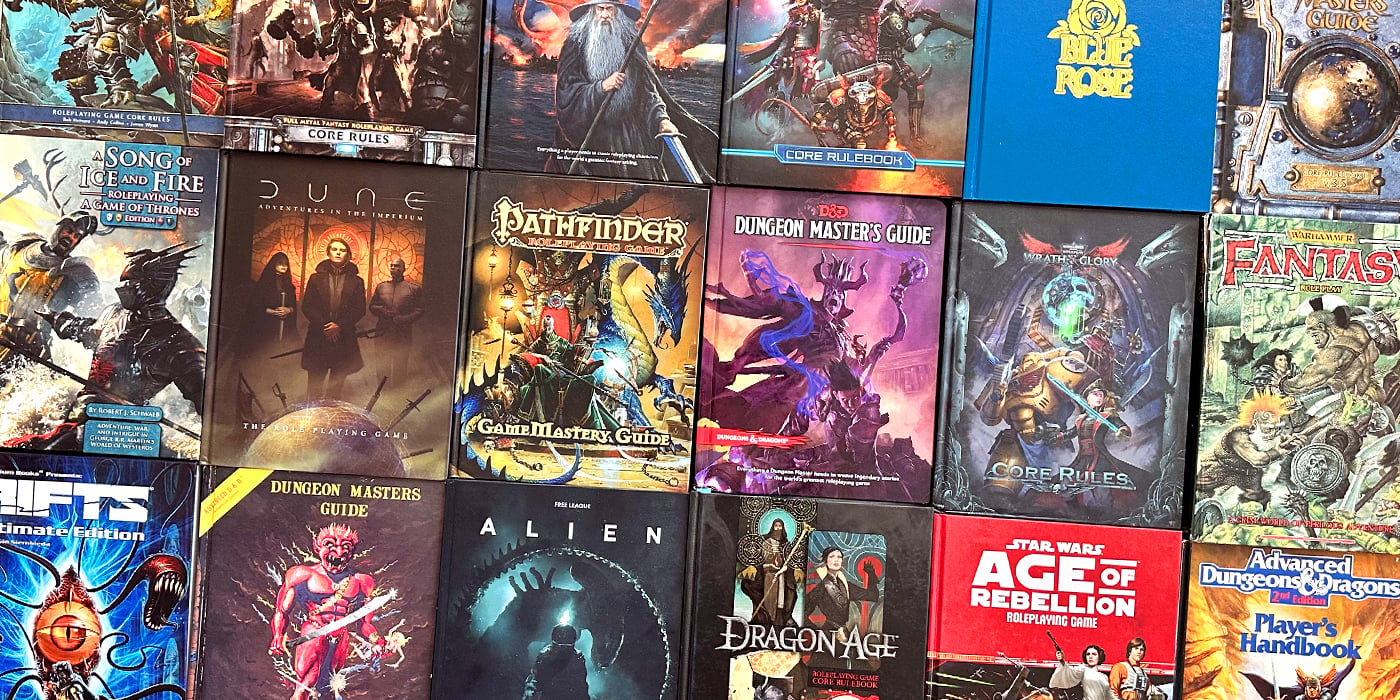Iron Kingdoms: Kings, Nations, and Gods Review
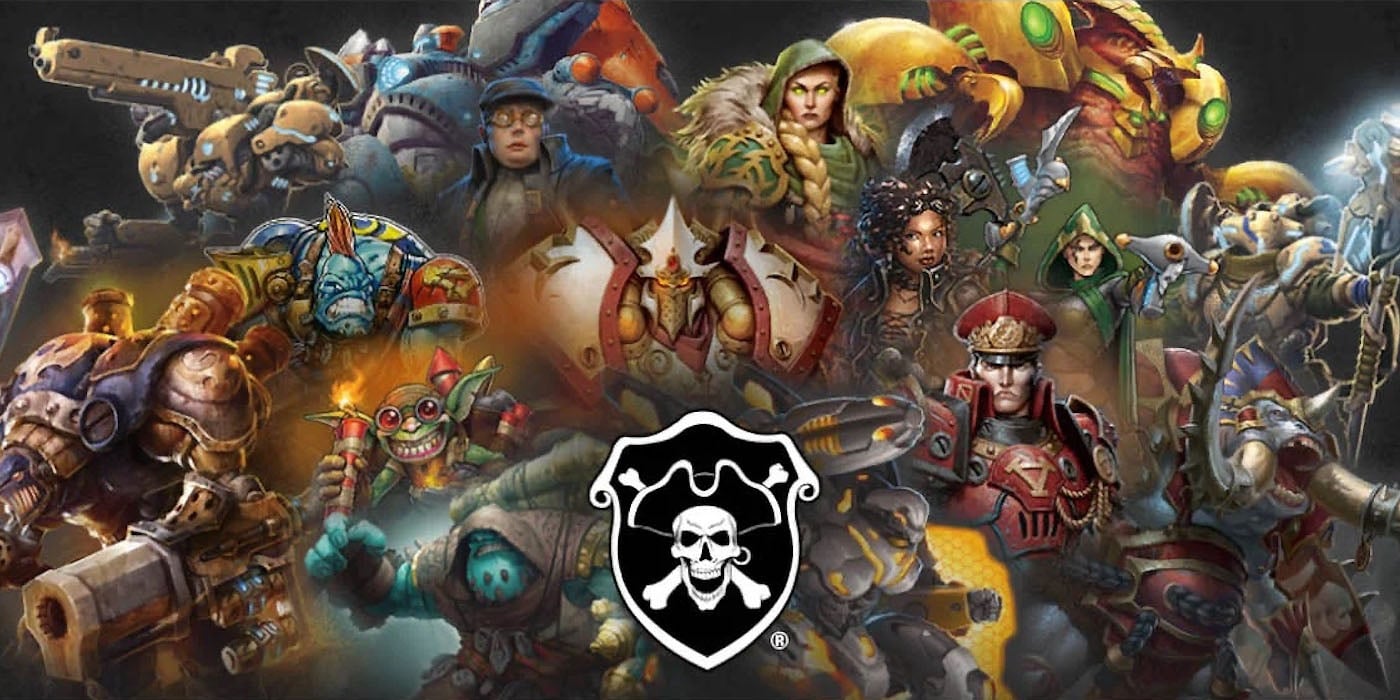
Last month, Privateer Press released Kings, Nations, and Gods, the first large content expansion for their role-playing game, Iron Kingdoms. At 385 pages, it is quite the weighty tome, but are its contents worth the cost of admission?
Background –
Kings, Nations, and Gods is a full-color book that focuses on the major human nations in the Iron Kingdoms, specifically Cygnar, Khador, Llael, Ord, and the Protectorate of Menoth, providing lengthy details on the different regions and major cities in each nation in addition to rules for nation-specific careers. When I say lengthy details, I mean it. Each national section contains the nation’s history, figures on their military organization and government, descriptions of the country’s various cultures, reports on the nation’s territories and those that rule over them, and information on the many influential organizations within that nation. The Cygnar section alone contains 80 pages of pure background information on the above topics. The description of Cygnar’s various duchies and cultures even go to the length of discussing preferred alcoholic beverages, cuisine, and music. There is also some fantastic new art with great depictions of various locales.
While you’ll be unlikely to find a level of detail on any one specific place commensurate to a city-focused book like Sharn: City of Towers, or Five Fingers: Port of Deceit, what you will find is a wealth of information about Western Immoren as a whole, enough to give a game master a solid grasp of the history, geography, military, and politics of any of the human nations.
It could certainly be argued that much of the information in this book can also be found in the now out-of-print Iron Kingdoms World Guide from the Dungeons and Dragons 3.5 OGL, but Kings, Nations, and Gods brings you the situation in Western Immoren as it stands in 608 AR, just after the events of Warmachine: Legends, some four years after the Khadoran Invasion of Llael when the original World Guide was set. In that time, rulers have fallen and been succeeded, borders have been redrawn, and war has raged with dire consequences throughout the continent. Even as someone who owns the original World Guide and has kept up with the continuing metaplot of the Iron Kingdoms through publications in No Quarter, Skull Island Expeditions, and the anthology books for Warmachine and Hordes, I still found Kings, Nations, and Gods to be a vast fountain of useful setting knowledge for anyone interested in either playing in or running an Iron Kingdoms game.
New Rules –
Where the rules in this book are concerned, Kings, Nations, and Gods provides you with loads of new options for both existing and new careers. For example, the Iron Kingdoms Core Rulebook has rules for Stormblades, but none of the other existing Storm Knight divisions. In Kings, Nations, and Gods, rules are provided to create these other careers using an altered version of an existing career or pairs of existing careers. Stormguard, for example, must take the Man-At-Arms and Stormblade careers and start with a Voltaic Haberd instead of a Storm Glaive and gain Set Defense and Specialization (Voltaic Halberd) instead of Blaster, Defensive Line, and Specialization (Storm Glaive).
Nation-specific Warcasters, Arcanists, and Gun Mages start with unique, altered spell lists, skills, Connections, and sometimes specialist equipment but are otherwise the same as the already existing generic versions. Completely new careers like Stormsmith, Doom Reaver, and Exemplar are also to be found, granting loads of options for a number of nation-exclusive careers for those looking to find a more specific experience in terms of party composition. There are also new skills for existing careers like Ironhead, granting Field Mechanics the ability to use mechanically-enhanced steam-powered armor. My favorite new career is absolutely Stormsmith, which is the only career to use Perception as the primary stat for making attacks, giving us our first Intellectual character option with native combat prowess.
In addition to all this, each national section contains rules for military warjacks and equipment found throughout the human nations of Western Immoren. Where warjacks are concerned, there are now rules for pretty much all (as of this article’s publication) existing non-character military warjacks in the human nations of the Iron Kingdoms. Rules for familiar weapons and equipment like flame spears and winter guard armor are also present, letting you build a generic Winter Guardsman with the Soldier career or Temple Flameguard using the Man-at-Arms career if you so desire.
Finally, each national section also contains two new adventuring companies specific to the nation’s military or political organizations, like Cygnar’s Unorthodox Engagement Team, Khador’s Greylords, Llael’s Heroes of the Resistance, Ord’s Agent’s of the Golden Crucible, or the Protectorate’s Crusaders. I’ve always been fond of this idea, not because of how they limit player options, but in how they provide a focus for your party and can serve as a solid jumping-off point for character creation and campaign writing.
Where the Iron Kingdoms Core Rulebook gave you the rules to play as more generic spy rings or mercenary companies, Kings, Nations, and Gods gives you everything you’d need to make your party have the feel of each individual nation with the rules to play as most anything that might attract your fancy in Warmachine.
State of The Iron Kingdoms RPG
What I find really fantastic about the Iron Kingdoms Roleplaying Game is the nature of career options and how esoteric some of them are. The Iron Kingdoms is nothing like many other popular class-based roleplaying games. A lot of thought needs to go into career selection at the time of party creation if the game is going to work, and not simply for the purpose of building a well-balanced group of tank/DPS/healer. For example, if you’re playing a political-spy game with loads of subterfuge and back-alley deals, careers like Doom Reaver or Storm Lance probably aren’t the greatest option.
The nation-specific nature of Kings, Nations, and Gods cements this idea further. There are some careers that likely won’t see a lot of play or even be at all appropriate in many games, like the Reclaimer for example, or the Thamarite Advocate from the previously released Urban Adventure supplement, or the Satyxis Raider Race/Career released on Privateer Press’s website. However, these archetypes are a part of the setting, and are consequently options that people may wish to look to when trying to play a specific campaign type. Access to some these corner case careers and adventuring companies can also be a huge boon to players and Game Masters by providing ideas for campaigns that are highly unique from the standard “good guy-dungeon crawl”. Flipping through this book, the Core Rulebook, Urban Adventure, and various issues of No Quarter has given me dozens of campaign concepts to think on.
The next book big release for the Iron Kingdoms will continue to develop this idea as well, focusing on the wilds of Western Immoren and providing us with new careers like the Warlock with the expansion following that looking at the fringe nations of Ios, Skorne, Rhul, and Cryx, perhaps giving us the rules to play as team of assassins of the Retribution of Scyrah. Needless to say, I’m excited for what’s on the horizon.
Kings, Nations, and Gods is a great book for anyone who never picked up the original Iron Kingdoms World Guide. Anyone who is thinking about running or playing in an Iron Kingdoms game would greatly benefit from giving this book a read. It can be found in Hardcover for $60 or through Privateer Press’s digital reader app for $40.

